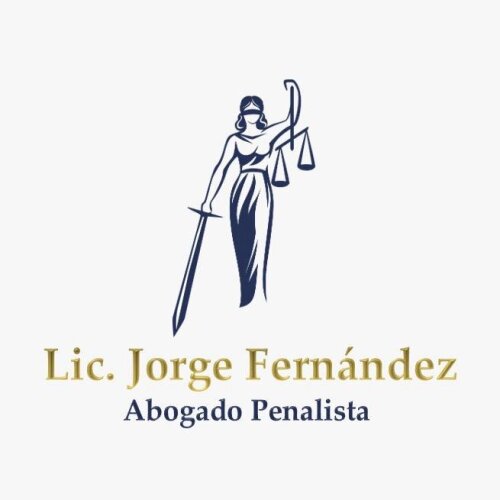Best Criminal Litigation Lawyers in Mexico
Share your needs with us, get contacted by law firms.
Free. Takes 2 min.
Or refine your search by selecting a city:
List of the best lawyers in Mexico
About Criminal Litigation Law in Mexico:
In Mexico, Criminal Litigation refers to the legal process that takes place when someone is accused of committing a crime. This process involves the investigation, trial, and potential sentencing of individuals accused of criminal actions. Criminal Litigation law in Mexico is based on the Mexican Constitution and the Federal Criminal Code, which outline the rights and obligations of both the accused and the state during criminal proceedings. It is crucial to have a thorough understanding of Mexican Criminal Litigation law if you are facing criminal charges or seeking legal representation.
Why You May Need a Lawyer:
There are various reasons why you may require a lawyer in Criminal Litigation in Mexico. Some common situations where legal help is necessary include being accused of a crime, being arrested by law enforcement, facing criminal charges in court, or needing to navigate the complex legal system. A lawyer specializing in Criminal Litigation can provide valuable guidance, legal representation, and defense strategies to protect your rights and ensure a fair trial.
Local Laws Overview:
Key aspects of local laws in Mexico that are particularly relevant to Criminal Litigation include the presumption of innocence, the right to legal representation, the right to due process, and the right to a fair trial. It is essential to understand these laws and how they apply to criminal cases to ensure that your rights are upheld during the legal process. Additionally, there are specific legal procedures and requirements that must be followed in Mexican Criminal Litigation, such as evidence presentation, witness testimony, and sentencing guidelines.
Frequently Asked Questions:
1. What are my rights if I am accused of a crime in Mexico?
As an accused individual in Mexico, you have the right to legal representation, the right to remain silent, the right to a fair trial, the right to be presumed innocent until proven guilty, and the right to due process.
2. How can a lawyer help me in Criminal Litigation in Mexico?
A lawyer specializing in Criminal Litigation can provide legal advice, defend your rights, represent you in court, negotiate with prosecutors, gather evidence, and create a strong defense strategy to protect your interests.
3. What are the potential consequences of a criminal conviction in Mexico?
The consequences of a criminal conviction in Mexico can vary depending on the severity of the crime and other factors. Possible consequences include fines, imprisonment, probation, community service, and other penalties.
4. What should I do if I am arrested by law enforcement in Mexico?
If you are arrested in Mexico, it is essential to remain calm, assert your right to legal representation, avoid making any statements without a lawyer present, and cooperate with law enforcement within legal boundaries.
5. How long does the Criminal Litigation process typically take in Mexico?
The duration of the Criminal Litigation process in Mexico can vary depending on the complexity of the case, the legal procedures involved, and other factors. Some criminal cases may be resolved quickly, while others may take months or years to reach a conclusion.
6. Can I appeal a criminal conviction in Mexico?
Yes, it is possible to appeal a criminal conviction in Mexico. The appeal process allows individuals to challenge the legal decisions made in their case and seek a review of the evidence or sentencing.
7. How can I find a reputable lawyer for Criminal Litigation in Mexico?
You can find a reputable lawyer for Criminal Litigation in Mexico by seeking recommendations from trusted sources, conducting online research, contacting legal associations, and scheduling consultations with potential lawyers to discuss your case.
8. What type of evidence is admissible in Mexican Criminal Litigation?
In Mexican Criminal Litigation, admissible evidence includes witness testimony, physical evidence, documentary evidence, expert testimony, and other relevant information that is obtained legally and meets the requirements of the legal system.
9. Are there alternative resolution methods for criminal cases in Mexico?
Yes, there are alternative resolution methods for criminal cases in Mexico, such as plea bargaining, mediation, and restorative justice programs. These methods can help resolve criminal cases outside of traditional court proceedings.
10. How much does it cost to hire a lawyer for Criminal Litigation in Mexico?
The cost of hiring a lawyer for Criminal Litigation in Mexico can vary depending on the complexity of the case, the lawyer's experience, and other factors. It is essential to discuss fees, payment arrangements, and legal expenses with your lawyer before entering into a representation agreement.
Additional Resources:
If you need legal advice or representation in Criminal Litigation in Mexico, you can contact the Mexican Bar Association, the National Human Rights Commission, the Public Defender's Office, or other legal organizations that specialize in criminal law. These resources can provide valuable support and guidance during your legal proceedings.
Next Steps:
If you require legal assistance in Criminal Litigation in Mexico, it is essential to seek advice from a qualified lawyer who can assess your case, explain your rights, and provide effective representation. Contact a reputable law firm, schedule a consultation, and discuss your legal options to ensure that your interests are protected throughout the criminal proceedings.
Lawzana helps you find the best lawyers and law firms in Mexico through a curated and pre-screened list of qualified legal professionals. Our platform offers rankings and detailed profiles of attorneys and law firms, allowing you to compare based on practice areas, including Criminal Litigation, experience, and client feedback.
Each profile includes a description of the firm's areas of practice, client reviews, team members and partners, year of establishment, spoken languages, office locations, contact information, social media presence, and any published articles or resources. Most firms on our platform speak English and are experienced in both local and international legal matters.
Get a quote from top-rated law firms in Mexico — quickly, securely, and without unnecessary hassle.
Disclaimer:
The information provided on this page is for general informational purposes only and does not constitute legal advice. While we strive to ensure the accuracy and relevance of the content, legal information may change over time, and interpretations of the law can vary. You should always consult with a qualified legal professional for advice specific to your situation.
We disclaim all liability for actions taken or not taken based on the content of this page. If you believe any information is incorrect or outdated, please contact us, and we will review and update it where appropriate.
Browse criminal litigation law firms by city in Mexico
Refine your search by selecting a city.

















